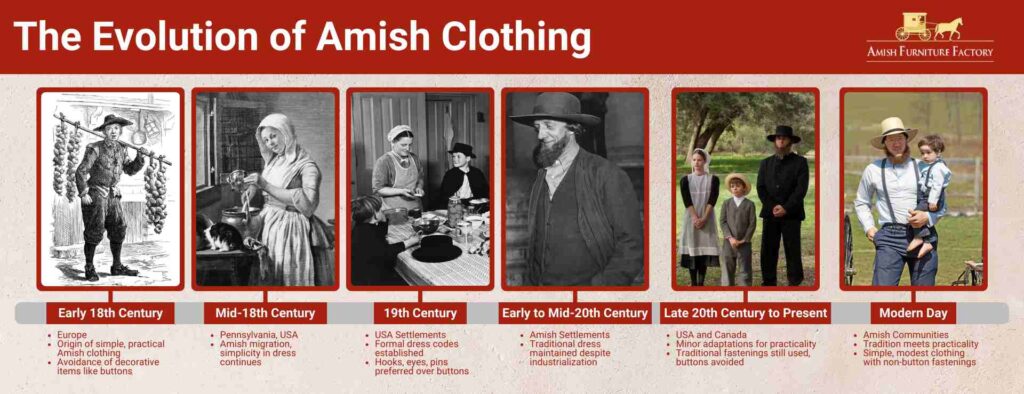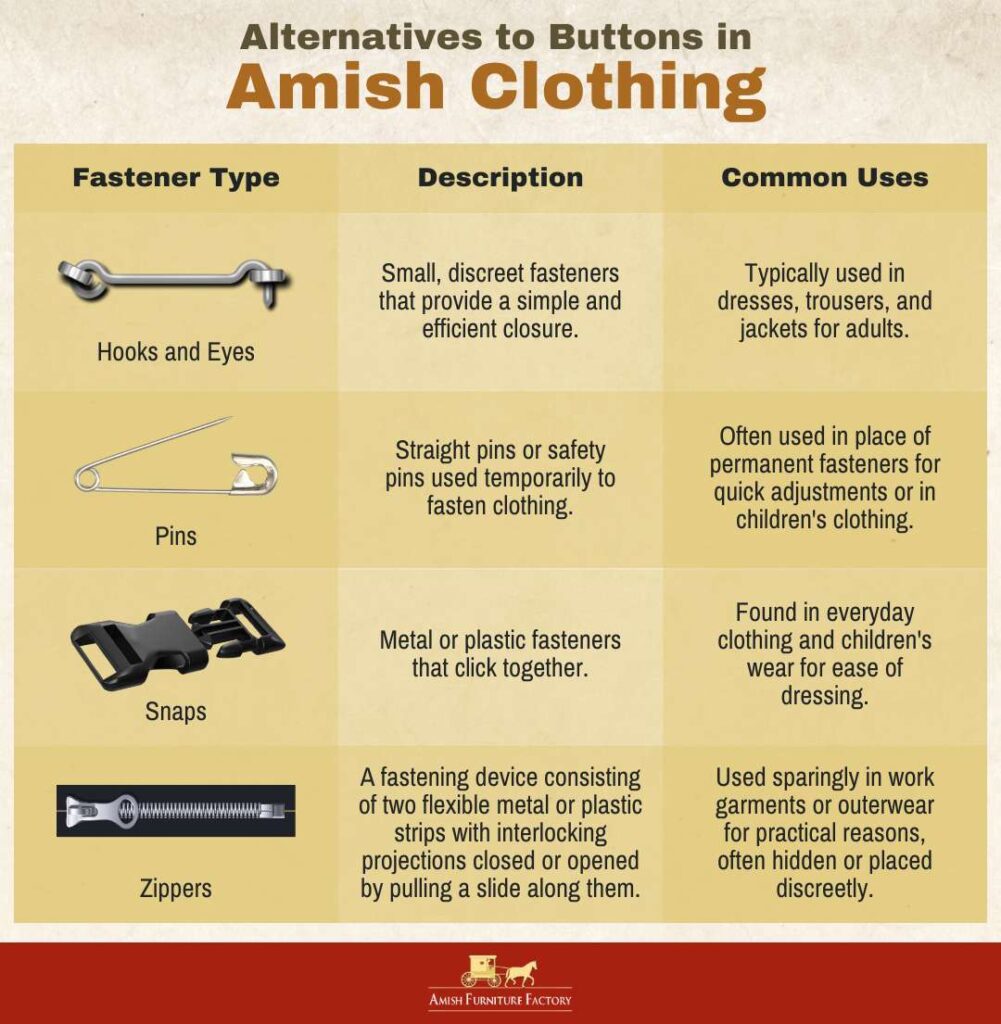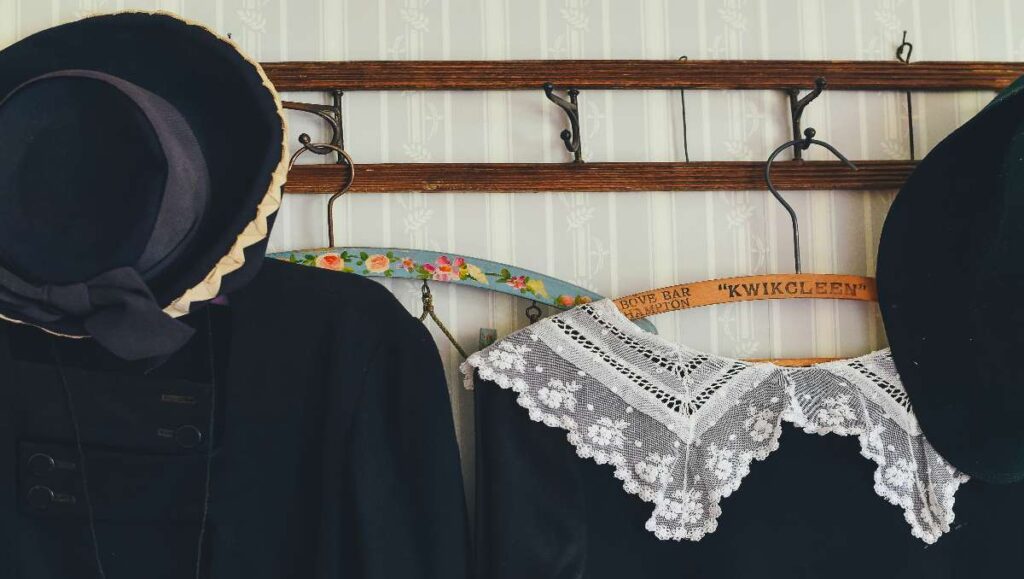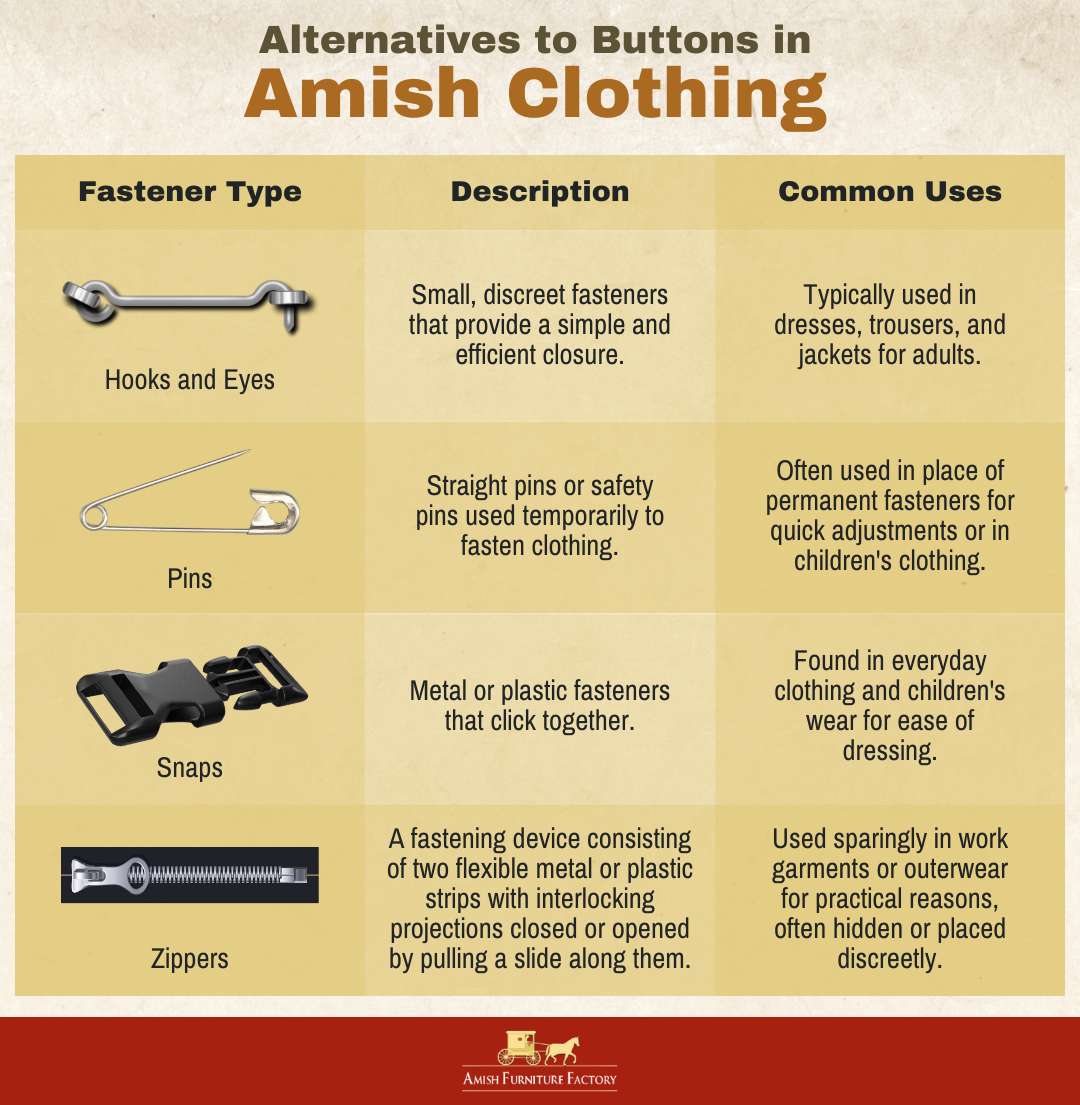
Have you ever wondered why Amish communities choose to forgo buttons on their clothing, opting instead for hooks, pins, or other fasteners? This unique aspect of the Amish dress code might seem peculiar at first glance, but it’s deeply rooted in their beliefs and way of life.
The Amish avoid buttons on their clothes as a symbol of simplicity and humility. They believe in living a life free of vanity and excess, and buttons, particularly decorative ones, are seen as contrary to these values.
In this article, we’ll delve deeper into the reasons behind this tradition, exploring how it fits into the broader context of Amish culture and values. From the historical origins of this practice to its implications for today’s Amish communities, we’ll uncover the significance of this seemingly small detail in their daily lives.
Early Clothing Practices within the Amish Community
The tradition of not using buttons can be traced back to the Amish’s early days in Europe. Buttons were often associated with military uniforms and later, with fashion trends that were considered too worldly or ostentatious for the Amish’s lifestyle.
By eschewing buttons, which were seen as symbols of vanity and excess, the Amish community aimed to live in a manner that was in harmony with their interpretation of Christian teachings on humility and simplicity.
For the Amish, every aspect of their dress code is a reflection of their religious beliefs. Clothing is meant to signify their commitment to God and to avoid drawing attention to the individual. By not using buttons, they adhere to a standard of plainness and functionality, avoiding any decorations that might signify status or wealth. This practice underscores the Amish belief in equality and community over individual expression.
To give you an overview on the history of Amish clothing, here’s an overview of their early clothing practices:

The first Amish settlers in America brought a specific style of clothing, heavily influenced by the clothing of European peasants in the 18th century. This choice aimed to keep the entire community grounded in its values and resist the changing tides of fashion and societal excess.
The simplicity of the Amish clothing served as a constant reminder of their commitment to a life focused on faith and community rather than individual expression or material possession.
Although the basic principles behind the Amish clothing have remained constant, slight adaptations have occurred. These changes, however, always stayed within the original concept.
Fabrics might have shifted due to availability, and slight variations in cut or color were introduced. Still, Amish attire’s original simplicity and functionality have stood the test of time.
This evolution reflects the community’s ability to adapt while maintaining its core values, demonstrating a balance between tradition and practical needs.
Why Do Amish People Don’t Have Buttons on Clothes?
The Amish community’s decision to forgo buttons on their clothing isn’t random; it’s profoundly embedded in their values and history.
Historically, buttons have been more than just functional items; they’ve served as symbols of military rank and distinction.
In the 17th and 18th centuries, ornate buttons were often used on military uniforms to indicate rank, with the most elaborate designs reserved for high-ranking officers. This military association made buttons emblematic of a hierarchical society based on power and dominance.
Beyond the military, buttons featured wealth and social status. In the 17th and 18th centuries, buttons made of precious metals and adorned with elaborate designs were popular among the European aristocracy.
Wearing such buttons was a way to display wealth and differentiate oneself from the lower classes. Using clothing and accessories to signify social status is antithetical to Amish principles.
Symbols of Vanity and Worldliness
The Amish concept of modesty covers behavior and appearance, guiding their clothing choices to eschew vanity. Grounded in biblical principles valuing inner virtue above outer looks, decorative buttons are considered indulgences in pride and individualism.
In broader society, clothing and accessories indicate status, wealth, and personal identity. The Amish rejection of buttons, mainly decorated ones, is part of a more significant effort to distance themselves from the non-Amish world.
Emphasis on Simplicity and Functionality
Amish clothing is designed with a focus on durability and ease of use. It is seen in the Amish people’s preference for quality fabrics and simple and efficient fasteners.
By eschewing fashion trends and elaborate decorations, the Amish highlight their commitment to a life not swayed by worldly desires or the pursuit of individual prestige. Their simple attire is a daily reminder of their devotion to a lifestyle that values substance over style and community welfare over personal expression.
Are There Occasions When Buttons Are Allowed?
While buttons are generally avoided in Amish clothing due to their symbolic implications, there are specific instances and conditions under which their use is deemed acceptable.

Workwear and Practical Needs
In workwear, buttons and zippers are sometimes used for their practical benefits. Garments designed for labor-intensive activities, such as farming or carpentry, may feature buttons to ensure durability and ease of movement.
These garments are chosen for their functionality, with buttons serving a clear purpose: to withstand the rigors of manual work while providing comfort and ease of use to the wearer.
Children’s Clothing
Using buttons in Amish children’s clothing is another area where practical considerations come into play. For infants and young children, buttoned clothing can simplify dressing and changing.
The Amish recognize parents’ challenges in managing their children’s needs and allow this practical adaptation. However, even in these instances, the buttons are typically simple and functional, aligning with the community’s overall ethos of modesty and simplicity.
Special Circumstances
Special circumstances, such as health-related issues, may necessitate the use of buttons for individuals within the Amish community.
When individuals face health issues or mobility challenges, the Amish may permit using buttons to accommodate these special needs. For example, someone recovering from surgery or living with a physical disability might find clothing with buttons easier to manage, facilitating independence and comfort.
Variations Among Amish Groups
The Amish are not a monolithic community; a spectrum of practices and beliefs exists across different Amish groups, particularly regarding clothing rules. This diversity symbolizes the community’s ability to adapt to varying contexts while maintaining core values. The variations among Amish groups regarding the use of buttons on clothing serve as a prime example of this adaptability.
Amish communities can be broadly categorized into groups such as the Old Order, New Order, and others, each with distinct interpretations of Amish doctrine, including dress codes.
While the Old Order Amish are known for their stringent adherence to traditional practices, including strict limitations on button use, New Order Amish and other more progressive groups may exhibit greater flexibility regarding clothing fasteners.
Geographical location also plays a significant role in the diversity of Amish clothing practices. Amish communities in different regions may adapt their dress codes to suit local climates, work needs, and interactions with non-Amish neighbors.
For instance, an Amish community in a more urban area or one that engages more frequently with non-Amish society might adopt slightly more lenient rules on buttons and other aspects of dress to navigate these interactions more effectively while still striving to maintain their distinct identity.
Modern Adaptations
Modern life has introduced new considerations for the Amish, leading to subtle adaptations in traditional practices, including clothing.
In specific contexts, modern life necessitates adaptations in traditional Amish clothing practices to accommodate practical needs. For instance, Amish individuals engaged in particular professions or activities that require interaction with broader society might incorporate buttons into their work attire for functionality.
This includes safety gear or specialized work clothing that adheres to required safety standards, illustrating a practical compromise that allows Amish workers to maintain their livelihoods without fundamentally compromising their values.
Introducing modern materials and safety considerations has also led to adaptations in traditional Amish dress. In some cases, zippers or velcro, alongside buttons, can be found in items where these fasteners provide enhanced functionality or safety that traditional alternatives cannot match.
These adaptations are carefully considered, ensuring changes align with the community’s principles.
Ceremonial or Formal Clothing
Ceremonial or formal occasions, such as conferences, weddings, funerals, and religious ceremonies, hold profound importance within the Amish community. These events are times when the community comes together to celebrate, mourn, or worship, and the clothing worn reflects the solemnity and significance of the occasion.
For such events, the Amish may incorporate buttons into their ceremonial attire in a way that adheres to their standards but allows for a degree of formal presentation.
Even in ceremonial attire, the Amish commitment to modesty and humility is paramount. Buttons used on such occasions are generally simple and functional, chosen to enhance the formality of the garment without overshadowing the event’s spiritual or communal importance.
For example, a bride’s dress or a groom’s suit may feature buttons, given that these buttons feature no design, reflecting the community’s dedication to plainness. This careful selection ensures that the attire harmonizes with Amish values, even as it marks a special occasion.
Alternatives to Buttons in Amish Clothing
In the Amish community, where buttons are eschewed mainly for their symbolic connotations, various alternative fasteners are embraced to maintain simplicity and modesty. These alternatives adhere to Amish values and fulfill the practical needs of daily wear and work attire.

A mainstay in Amish clothing, hooks and eyes are discreet, efficient, and align with the community’s emphasis on simplicity. They are commonly used in place of buttons on dresses, pants, and other garments, providing a secure closure that is both functional and modest.
Similarly, snaps offer a practical solution for fastening clothing, particularly for children’s wear and some types of work attire. They are easy to fasten and unfasten, making them a convenient option for daily use. Snaps are chosen for their functionality and the fact that they do not draw attention.
As reported by USA Today, “Such things as Velcro and zippers are banned. Instead, clothes are fastened by pins or hook-and-eye closures.” While a few less-conservative Amish groups rarely use zippers for work jackets and boots, the use of such is still frowned upon by many.
Traditional sewing techniques are crucial in incorporating these alternative fasteners into Amish clothing. Passed down through generations, the manual attachment of hooks and eyes and snaps demonstrates a dedication to creating garments that are not only practical but also lasting.
Amish sewers, often using treadle sewing machines or hand-sewing methods, exhibit a high skill level in embedding these fasteners into clothing. This meticulous approach ensures that garments meet the general community’s standards.
How Amish Clothing Practices Are Affected by External Influences
The Amish community is not immune to the influences of the external world. These influences have subtly shaped their clothing practices, demonstrating a practical approach to maintaining their values in a changing environment.

Adaptation to Modern Materials
The introduction of new, more durable materials has influenced Amish clothing practices. While traditional fabrics like wool and cotton remain staples, synthetic materials that offer longevity and practical benefits are sometimes incorporated into garments.
This adaptation ensures clothing meets the community’s standards even as the materials evolve with advancements in textile technology.
Safety and Professional Requirements
Work in specific environments requires Amish individuals to wear safety gear that may not strictly adhere to traditional dress codes. For instance, reflective vests or helmets for construction work are accepted as necessary adaptations to ensure safety.
This acceptance reflects the community’s willingness to modify practices in response to practical needs, emphasizing a common-sense approach to external requirements.
Influence of Non-Amish Society
Interactions with non-Amish society, through business, healthcare, and education, have also led to adjustments in Amish clothing practices. These minimal changes signify the community’s ability to navigate its identity in a broader societal context.
For example, slight modifications in the style or fit of garments may occur, aimed at facilitating these interactions while still upholding Amish principles.
Cultural Preservation Amid Change
Despite these adaptations, the Amish community remains steadfast in its commitment to cultural preservation. The changes in response to external influences are carefully balanced with the desire to maintain a distinct Amish identity.
This delicate balance showcases the community’s resilience and ingenuity in preserving their way of life amid the pressures of the modern world.
A Testament to Simplicity and Humility
As we’ve explored the reasons behind the Amish’s avoidance of buttons—ranging from historical associations to the symbolism of vanity—it becomes evident that this choice is a deliberate affirmation of their identity.
Even as they navigate the necessities of modern life, the Amish community demonstrates a remarkable ability to adapt while steadfastly preserving their core principles. Their buttonless and unadorned clothing is a testament to a way of life that cherishes simplicity and humility.
